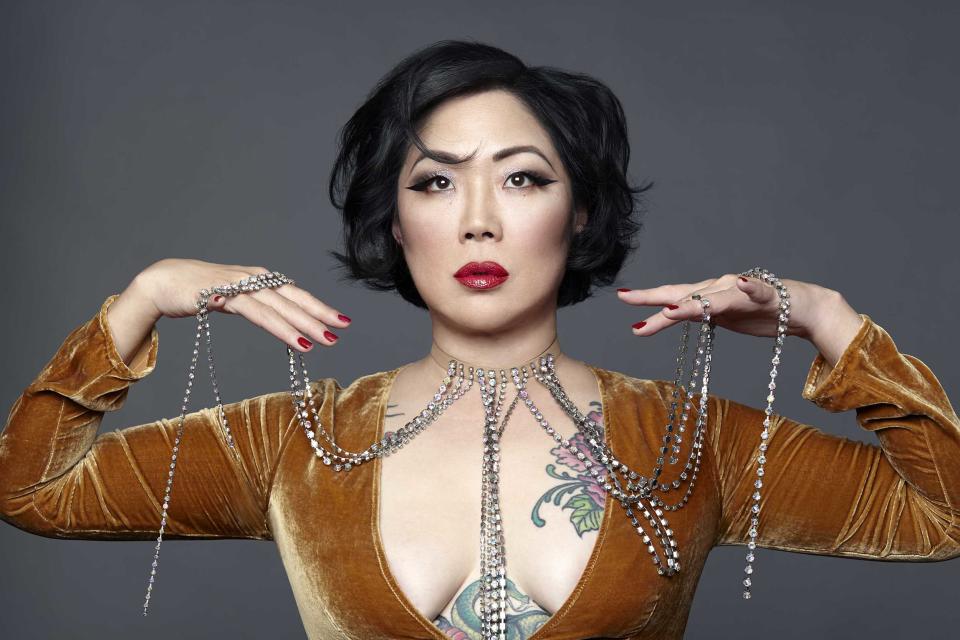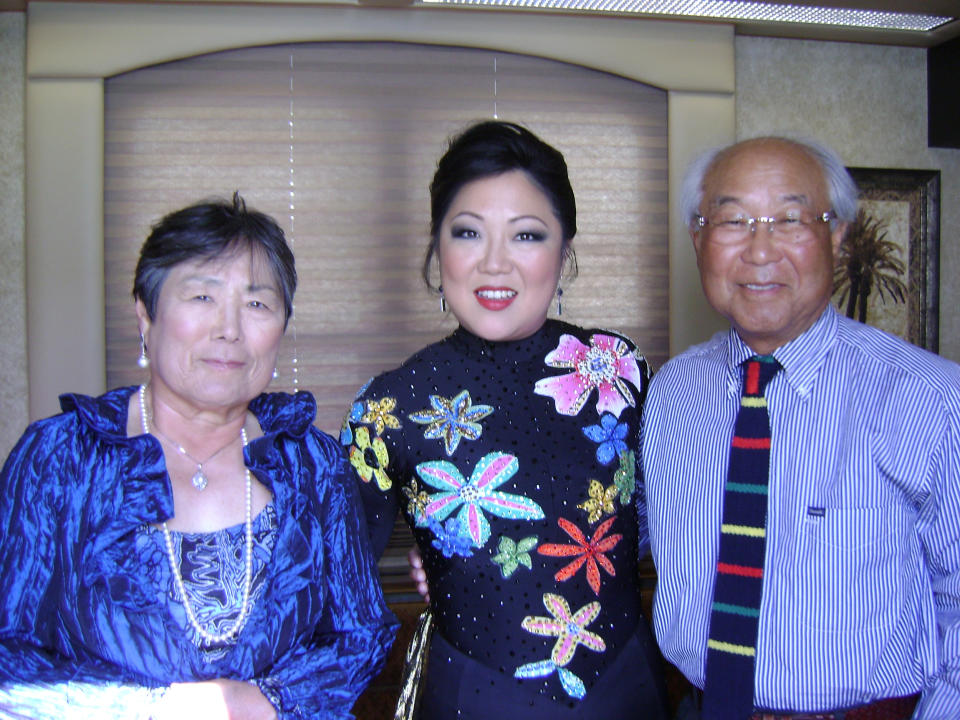Margaret Cho is done coping with Asian hate in silence: 'The invisibility is the worst'
- Oops!Something went wrong.Please try again later.
During Asian Pacific American Heritage Month, TODAY is sharing the community’s history, pain, joy and what’s next for the AAPI movement. We will be publishing personal essays, stories, videos and specials throughout the entire month of May.
Margaret Cho is one of the most visible Asian American performers in pop culture, and she has been for quite some time. From her '90s sitcom “All-American Girl” to beloved cameos in everything from “Sex and the City” to “30 Rock,” the 52-year-old actor, comedian, author, fashion designer and singer has been there and done that.
When I phone the multi-hyphenate star for this interview, I naively attempt to compartmentalize our conversation for two articles: one in honor of Asian Pacific American Heritage Month and the other for a profile in honor of LGBTQ Pride Month in June. But that was my mistake, because you just don’t try and pigeonhole the identities of a person as fascinating and complex as Cho. I quickly learned this with my first question, regarding the rise in anti-Asian hate incidents that have spiked during the pandemic.

“It's been really alarming, but it's also something that I remember very clearly from the AIDS epidemic, because there was so much homophobic hate crimes happening during that era,” Cho, who is Korean and bisexual, recalled to TODAY.
“People were using AIDS as an excuse to act out on their homophobic rage. The disease and the pandemic, which AIDS was and as coronavirus is now, they have nothing to do with these groups of people. They want to use their hatred as a way to communicate their fear and it's really scary, but it's something that we've seen before.”
Watch TODAY All Day! Get the best news, information and inspiration from TODAY, all day long.
Sign up for the TODAY Newsletter!
A recent compilation of hate crime data revealed that an increase in attacks against Asian Americans in 2020 has only persisted into 2021. Released by the Center for the Study of Hate & Extremism at California State University, San Bernardino, the research compared data from the first quarter of 2020 to the same time period in 2021 and found that hate crimes surged by 169 percent.
Despite this recent explosion, Cho pointed out that this isn’t a new chapter in American history.
“Asian Americans have a long history of this kind of violence,” she explained. “Anytime America is in crisis, our Americanness comes into question. So this is like the major thing that I've noticed — from the gold rush to the 1871 Chinese massacre in (Los Angeles') Chinatown, to Japanese internment camps, to the collapse of the American auto industry — there's cyclical patterns around violence against Asian Americans and it very much correlates and corresponds with financial insecurity for Americans.”

Two of the people Cho worries most about right now are her parents, especially since many of the hate incidents taking place seem to target older Asian Americans.
“Well, it's very scary, but I think that my parents have experienced so many different kinds of racism over their years here,” she said. “They've been here since 1964. So they're realizing that this comes in a wave and now they're very philosophical about it. I think that's why they're old. They're in their mid-80s and it's because we just know how to cope with this. But it's not possible to cope anymore in silence. That’s not OK anymore, it's not going to be absorbed and we can't be silent about it.”
For someone as outspoken as Cho, it's noteworthy to hear her talk about her voice being oppressed. This invisibility of experience is at the root of the conversations she is having right now, especially with white people.
"The idea that there isn't racism against Asian Americans is absolutely untrue," Cho told TODAY. "Of course, there is. The silence around it and the unawareness and just the misinformation about it, it's really bad. That alone kind of constitutes most of the main conversation. The invisibility is the worst, so every conversation is really about that. It's like just people not being aware, and especially white people not being aware."
Related: When it comes to anti-racist education and actions, "it starts with self and has a ripple effect.”
One of the ways Cho is engaging in these conversations and fighting misinformation is with her podcast, "The Margaret Cho," that aims to bring awareness to these issues. For the podcast's second season, Cho launched a series titled "Mortal Minority," a twist on the "model minority" myth that's used to stereotype Asian Americans.
“It’s all about the history of violence against Asian Americans, and also instances where we've been the perpetrators as well,” she explained. “So there's a rejection of the idea of being a model. I'm talking to other Asian activists, artists, filmmakers, any kind of authors, lots of different media personalities.”
This work is also how Cho copes with her own fear, which can sometimes feel overwhelming. “It's about taking those anxieties and turning that into action,” she said. “Whether that be very active talking about these issues, whether it's making art about it, writing about it, whether it's posting on social media, it's about being very active and engaged with the anxiety so that it doesn't completely shut me down.”
Cho is even working on an upcoming project with Jay Leno for CNBC, despite Leno’s track record with offensive anti-Asian comedy.
“Frankly, Asian jokes go over my head because I’ve heard so many of them,” she told Entertainment Weekly for their upcoming June issue, which TODAY reviewed. “I do a noise-canceling thing with them. I booked Jay quite a while ago. For him to step up and take responsibility is very meaningful. I’m so pleased with his response. I accept apologies.”

For now, Cho is continuing to break down barriers and bridge the gap between herself and others.
“I think it's just really about representation and being able to present the idea that even as other, we still are inside. There is definitely a place for storytelling about otherness that can include everyone, that is open for everyone and invites everyone as audience,” she told TODAY. “So I think that it's important to be able to continue to be a storyteller and really share the experience of the other for those who don't feel othered.”
She pointed out other Asian American luminaries are doing this work too, including BD Wong, Olivia Munn, Awkwafina and Bowen Yang.
“All these amazing voices, opinions, thoughts and ideas that are expressed by younger Asian American people, I'm really proud of them,” she said, adding, “Oh, and queerness is a really a big part of that, too."
Related:

